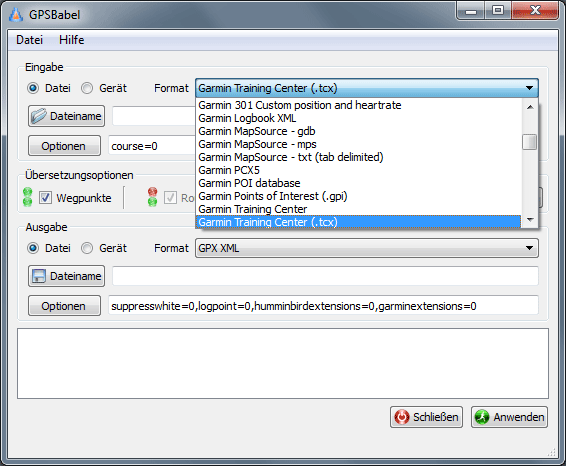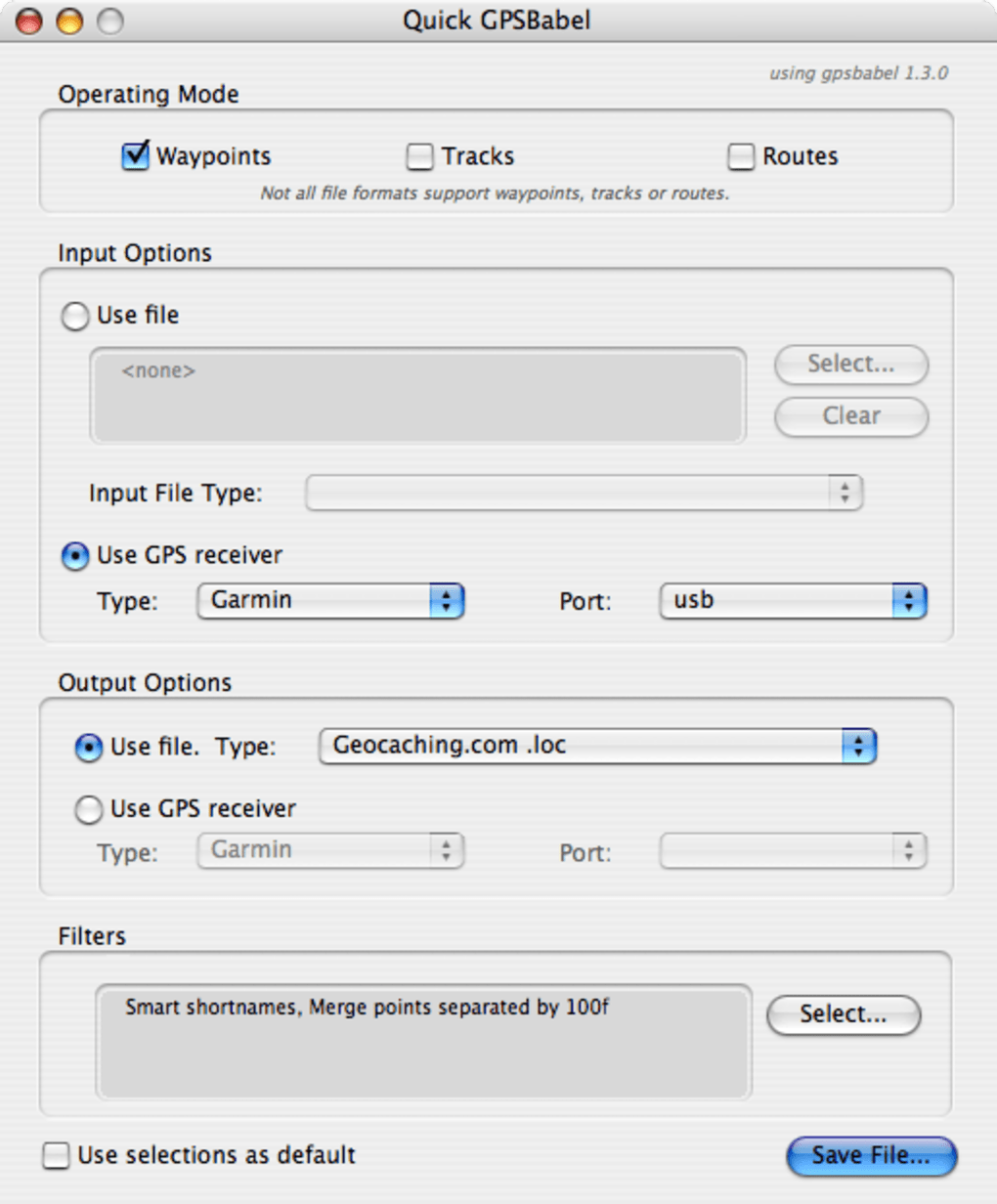Gpsbabel For Mac
GPSBabel 14 file extension associations. 2016 autocad for mac os x. A program for conversion of various waypoint and GPS map formats: GPSBabel for Linux 14 file extension associations. Program for Linux that allows users to convert waypoints, tracks, and routes between popular GPS receivers: GPSBabel for Mac 14 file extension associations.
Almost certainly. GPSBabel runs on Microsoft Windows Windows 7-10 as well as POSIX OSes such as Mac OS/X and Linux. This is amazing! What does it cost? GPSBabel is free software. It is free to download and use, and it's free to modify for your use, as it's distributed under the GNU Public License. Supporting the project. TrailRunner Mini. TrailRunner is probably the most popular GPS app for Macs and TrailRunner mini. GPSBabel converts waypoints, tracks, and routes from one format to another, whether that format is a common mapping format like Delorme, Streets and Trips, or even a serial upload or download to a GPS unit such as those from Garmin and Magellan. By flattening the Tower of Babel that the authors of various programs for manipulating GPS data have imposed upon us, GPSBabel returns to us the.
This page details how to call the GPSBabel program from the command line. As with many powerful tools, the command line is where much of the interesting functionality lives. The trade-off is a small learning curve. For (GUI) alternatives, see GPSBabel or making GPX Tracks.
You can get more information by running gpsbabel -?, and by reading the README file.
Gpsbabel For Macrame
- 2GPS device communication via serial or USB ports
- 2.1Reading waypoints from a GPS
Basic command
The basic command line looks like this:
where ‘INTYPE’ and 'OUTTYPE' are formats that GPSBabel understands and 'INFILE' and ‘OUTFILE’ are the locations of that data. That location can be either a file or the name of a physical device. For example a serial port may appear as 'com1' under Windows or '/dev/ttyS0' under Linux.
As an example, let us suppose you have latitude, longitude, and waypoint name in a file 'way.csv'
To convert this CSV file into the GPX format (file way.gpx) we use this command:

Deconstructing the command line: '-i csv' using the comma separated value INTYPE. '-f way.csv' (note that is a lower case f) specifies the name of the input file (or the name of the input serial port). '-o gpx' specifies the output is GPX format. '-F way.gpx' (capital F) provides the name of the output file (or output serial port). For a more robust alternative to the three-field format of GPSBabel's strict CSV format, consider using unicsv which lets you specify headers and many more field types. That's generally a better format for interoperating with a database or spreadsheet.
GPS device communication via serial or USB ports
Gpsbabel For Mac Catalina
Most of the following subsections' content only is relevant if you do not already have a GPX file (e.g. written by your GPS device or by a smartphone app).
Screen recorder for mac free download. Drag the thumbnail to move the recording to another location, such as to a document, an email, a Finder window, or the Trash.
GPSBabel directly supports hundreds of GPS receivers from Garmin, Magellan, Wintec and more. Connect your GPS to your serial port or USB port depending on your device type (for connecting serial receivers to USB ports see GPS Serial to USB). A Garmin serial protocol GPS is specified -i garmin while a Magellan is -i magellan. Use the -f and -F parameters to specify the serial port for your GPS. Use -f when you read from the GPS and -F to write to the GPS. (NB, if the following commands do not appear to work on the Garmin units, check that the Interface Setting on the unit is set to 'GARMIN' or 'GARMIN DGPS').
Reading waypoints from a GPS
Here are some examples to read waypoints from a Garmin GPS and write them out to the GPX format file named 'waypoint.gpx.'
Windows
Under Windows assume the GPS is attached to the first serial port:
That sets the input type to the Garmin serial protocol to read data from the serial port and write it to a GPX format file named waypoint.gpx.
If instead the device is connected to the USB port:
Linux
Assume the GPS receiver is attached to the first serial port. (Need to run as a user who has rights to read the serial port, so some systems may require the program to run as root or with sudo.)
If the device is connected to the USB port, try /dev/ttyUSB0 or usb:
See also: http://www.gpsbabel.org/os/Linux_Hotplug.html, USB Garmin on GNU/Linux
If you have problems accessing the USB0 port on your Ubuntu Linux, you might want to read this discussion thread on Ubuntu Forums and remove the packages brltty and brltty-x11 (Braille support apparently breaks USB serial). Don't forget to power on the GPS unit first!
A maybe useful bash script: download track and waypoints
GPSBabel bash script for downloading tracks,waypoints & routes available from: gerkin

Mac OSX
Under OSX assume the GPS is attached to a serial to USB adapter
Under OSX 10.8 there was no /dev/cu.usbserial0 but I found that this worked for a USB device:

Track logs
To read track logs you add a '-t' in front of the input (-i) specifier. So to get tracklogs under Windows:
Routes
And in the same way, you can read or write routes with the -r parameter:
Note: When you write a route a waypoint will be generated for each route point. This is annoying. Since waypoints have globally unique names, your route points will be renamed if they collide with another route (a common problem would be numeric names eg. '1' '2' being renamed to '1 1' '2 1' etc.) To prevent this happening use John Dally's patch for gpsbabel.
Writing data to a GPS
You can also write tracklogs, waypoints, and routes back to your gps by swapping the input and output parameters. To write waypoints from waypoint.gpx to a Garmin unit under Windows:
Using Filters
See using filters with GPSBabel for information on using GPSBabel filters to edit your track.
The primary purpose of our website is to provide the user with a list of software programs that support a particular file extension, as well as that help to convert them to another format. GPSBabel for Mac supports 0 different file extensions, that's why it was found in our database. The following tables provide information about the association of GPSBabel for Mac with file extensions. If the GPSBabel for Mac program can be used to convert the file format to another one, such information will also be provided.
Associations of GPSBabel for Mac with the file extensions
GPSBabel for Mac converts the files:
What can I use this information for?
This information is especially useful when looking for a way to open a specific file. If you already have GPSBabel for Mac installed on your computer, you can check which file extensions it supports and look for the data you need in this specific format (or to what format you should convert the data so that you can open them in the GPSBabel for Mac).
I do not have a GPSBabel for Mac yet. Where should I get it?

By far the most safe way is to download GPSBabel for Mac directly from the developers's website. If you are going to download the GPSBabel for Mac from a website that offers a database of downloadable software, you have to reckon with the fact that when you install it on your computer, you will also install the unwanted extras. Please, pay special attention to this.
Gpsbabel For Mac
I cannot see the file extensions. What should I do?
Gpsbabel For Macbook Pro
File extensions are not normally displayed to users. To change this, go to Control Panel, select Appearance and Personalization and Folder Options. Next, select the View and find the option 'Hide extensions for known file types'. The option should be deselected (cleared) and confirmed with OK.
